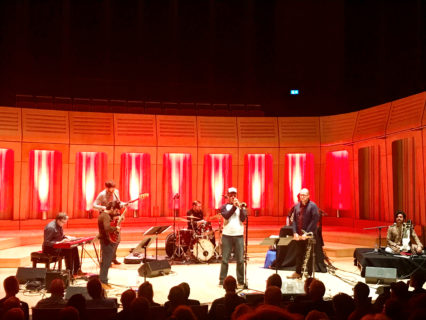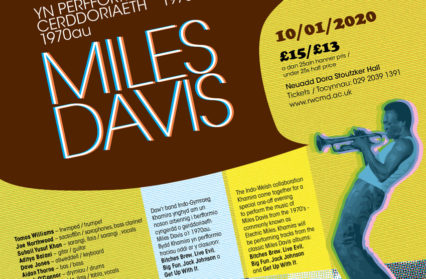Indo-Welsh jazz band Khamira start off a short stint of Welsh live dates in preparation for the recording of their second album with an evening of music from Miles Davis’s 1970s albums at the Royal Welsh College of Music and Drama (RWCMD) in Cardiff. Gary Raymond was there.

It’s a bold move, to offer up an evening of interpretations of Miles Davis’s 1970s output, one that would be daunting enough if half your band didn’t live a couple of continents away. Khamira is a band born of the India-Wales year of cultural collaboration established to commemorate seventy years of Indian independence from the British Empire in 1957. This is the second time since 2016 that the Indian members of the band have been to Wales, continuing a collaboration that has so far yielded successful tours of Wales and the subcontinent, and one very good self-titled studio album. The last time they were here, they rounded off a nationwide tour by bringing the tent down at the Hay Festival. This visit will garner a second album, a project that for a while looked like being something of a pipe dream, and it’s to the credit of Wales Arts International and the British Council that they both continue to find ways to facilitate these musicians, and getting them in a room together. What the second album will produce is not obvious this evening, as the bulk of stage time is given over to Davis. But this is a shrewd move by the driving force behind the band, Tomos Williams. As good as Khamira is, they are yet to be a serious pull to anyone other than those in the know. They simply cannot benefit from the publicity of a sustained presence on any circuit. A full capacity Dora Stoutzker Hall at Cardiff’s Royal Welsh College of Music and Drama suggests a healthy curiosity for what a band will do with the infamously aggressive electro-funk period of Miles Davis’s most controversial period. It’s a rare thing to see this music performed live. Williams, maybe taking a punt, has trusted his passion for this music will translate into bums on seats. His faith is repaid, and Khamira does a sterling job with the material. They may prove to not have the same levels of aggression (some of those live recordings of Davis in the early seventies are terrifying), but then they also don’t have the Himalayan mounds of cocaine that contributed to Davis’s edge in those days either, and in the end, the chilled-ness Khamira bring to the material is not only welcome but feels somewhat appropriate for the setting.
The “relaxedness” of the band – or perhaps their nerves – means it takes a while for them to find their groove, and it’s guest keys player Huw Warren who seems to kick everyone into gear in the opening “Directions”/”Great Expectations”. Warren is an intense focal point on stage, modest and off centre, his solos are blistering, expansive, and sometimes threaten to burst the whole band right open. The other musicians step carefully around him, with only second guest Joe Northwood picking up some of that intensity and running with it with some ferocious contributions on sax in the second half of the set. The first half, before Warren and Northwood take a sabbatical and Khamira play a few tracks from their debut album (sumptuous reworkings of trad Welsh folk and Sufi classical), is placid, like walking slowly into a remote lake. Williams guides the band, and he stalks the stage half-proud father and half-explorer in a new, dangerous, but familiar land. His horn is beautifully controlled, pulling soloists back to the root of the number, springboarding them off. Mark O’Connor is as solid as ever – there is no better drummer working in Wales today. Aidan Thorne on bass gives perhaps a little less propulsion than what would have been required to push the band into the stratosphere, but he handles the complex changes well. His sound is a little thin, his bass too compressed, and a fatter sound would have shaken the crowd up a bit. The 70s Davis stuff should, if we’re honest, rattle your rib cage.
The Indian contingent offers some magical interludes. The mid-section of original material is, in the end, a highlight, and no doubt would have delighted and surprised those who went on the strength on the promise of some live Miles Davis music. The heaviest contributions of Suhail Yusuf Khan on sarangi and Vishal Nagar on tabla lift the evening to another plane, one that makes clear the connections between forms and the soulful connections between band members. They are highlights of a gripping evening. “Basant” is captivating, Nagar almost creating a vacuum in which his vocal work jars and bends. None of this sticks out. It blends with the Miles stuff perfectly. The choice of material, the assembly of the set, is a carefully constructed thing.
With that in mind, it is perhaps a shame that an engrossing evening of important music shows us a glimmer of something even more powerful when the band get to “Right Off” toward the end, taken from A Tribute to Jack Johnson (1971). It’s the track where Aditya Balanyi shines on guitar, filling the boots of John McLaughlin with some real class. Here everything comes together on arguably the most difficult piece to recreate live. The Jack Johnson album was patched together from hours upon hours of jam sessions, clipped and glued into the two-track 50-minute onslaught we have today. Firstly, credit to Khamira for being able to navigate those edits in a live situation. But secondly, that they did so with such an emancipated force suggests there is something in this combo that remains untapped. Perhaps it never will be, given the geographical logistics of the membership; but “Right Off” proved it was there. It was stunning.
Picking this period of Davis’s work is an interesting choice, perhaps more than it would have been for any other artist. To some extent, Davis’s life work is one evolutionary model, a Bayeux Tapestry marking the fraught journey of his genius, including love affairs, violence, and constellational interjections writ large. To isolate one period is to create a new context for it. The oxygen of the music has to come from somewhere else. You wouldn’t have this problem covering any of the few artists you could argue rival Davis in genius. Bob Dylan, for instance, recorded every album like it was his first. Bowie recreated himself with every step. Prince laid out the consummate pop career for the most part, in a constant dance with the whores of the zeitgeist. But every Miles Davis album bleeds into the next. You can trace his thought process, almost, from playing the trumpet in Charlie Parker’s band in the 1930s to shaking the foundations of Fillmore East in ’72 with his fusion of funk, jazz, and what in another decade or so would come to be known as “world music”.
For all of the awe bestowed upon his work with Gil Evans, his second quintet, Kind of Blue, his early ’60s period, it is perhaps his 70s palette that has configured the paints of so many artists to come after. Bitches Brew (1970), Big Fun (1974), A Tribute to Jack Johnson (1971), Live-Evil (1971), and Get Up With It (1974) are all represented here this evening (it’s a great shame there’s nothing from the searing, occultist lunacy of On the Corner (1974), my favourite of all Davis’s studio recordings, and the one major album of this period not included in this setlist). Khamira have shown there is a real audience for this kind of music in Wales, and hopefully, after their second album, it will no longer be so difficult to get all these guys on a stage together in future.
Khamira‘s website offers updates of the band’s performances and new music releases.
For future similar performances at the Royal Welsh College of Music and Drama, click here.



 Enjoyed this article? Support our writers directly by buying them a coffee and clicking this link.
Enjoyed this article? Support our writers directly by buying them a coffee and clicking this link.







